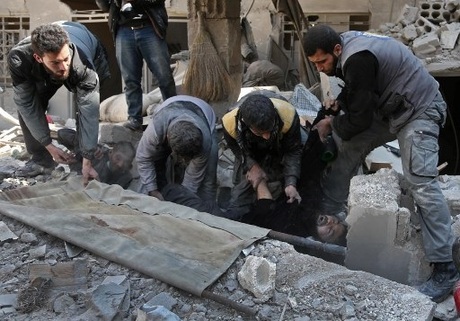Fears and Outrage over Bloodshed in Syria Enclave
إقرأ هذا الخبر بالعربية
Syrian jets carried out more deadly raids on Eastern Ghouta Wednesday, as Western powers and aid agencies voiced alarm over the mounting death toll and spiraling humanitarian catastrophe.
The regime of President Bashar al-Assad intensified its strikes this month on the rebel enclave east of Damascus, where close to 300 civilians have been killed since Sunday.
Warplanes continued to pound Eastern Ghouta towns on Wednesday, killing 24 civilians, according to the Syrian Observatory for Human Rights.
Most of them were killed when barrel bombs -- crude, improvised munitions that usually cause indiscriminate damage -- were dropped on the town of Kfar Batna, the Britain-based war monitor said.
More than 1,400 people were wounded in three days that saw the bloodiest wave of strikes on the enclave since the start of the civil war in 2011.
Medics have been overwhelmed throughout February. The five-year siege of the enclave has restricted access to medical supplies, while three clinics were hit and put out of service this week.
The hospital in the town of Arbin was hit twice on Tuesday and the Observatory said Russian warplanes had carried out that strike and others, its first on Eastern Ghouta in three months.
The Kremlin on Wednesday denied any involvement in the strikes and rejected reports to the contrary as "groundless accusations."
The hospital in Douma, the largest town in Eastern Ghouta, is still functioning but the influx of wounded is such that doctors and nurses cannot save everyone.
"We received a mother yesterday who was pulled from the rubble. She was six-months pregnant and seriously wounded," said surgical nurse Maram.
"We did a C-section but could not save her, nor her baby," she said.
- Outcry -
Next to her a man expressed his anger after bringing the body of his neighbors' daughter -- retrieved dead from the rubble of her home -- to the mortuary.
"What crime did this girl commit, what is her crime?," he shouted.
Observatory head Rami Abdel Rahman said at least 67 children were among the 274 people killed in strikes since Sunday.
The bloodshed prompted U.N. children's agency UNICEF to issue a largely blank statement saying "we no longer have the words to describe children's suffering."
U.N. chief Antonio Guterres said he was "deeply alarmed" by the escalation of violence.
U.S. State Department spokeswoman Heather Nauert criticized the "siege and starve tactics" of the Assad regime and said: "The cessation of violence must begin now."
Eastern Ghouta is home to more than 400,000 people living under crippling siege, with little access to food or basic services.
Anti-regime groups, mostly Islamist factions as well as al-Qaida's former Syrian affiliate, have controlled the area since 2012.
With the Islamic State group's once sprawling "caliphate" now wiped of the map, the regime looks bent on completing its reconquest by taking on remaining enemies.
- New Aleppo -
In recent days, government forces have been been massing around Eastern Ghouta, apparently preparing for a ground offensive.
"We have long feared Eastern Ghouta will see a repeat of the terrible scenes observed by the world during the fall of east Aleppo and these fears seem to be well founded," said Mark Schnellbaecher, the regional head of the International Rescue Committee.
The battle that saw government forces wrest back the country's second city from rebel forces in 2016 caused extensive destruction and suffering that drew comparisons with the World War II era devastation in Stalingrad and the Warsaw ghetto.
The regime is also seeking to restore its grip on other areas in the north, including the province of Idlib, the last one that remains largely outside its control.
On Tuesday, regime forces deployed inside the region of Afrin, a Kurdish enclave along Syria's northern border with Turkey.
The move came after Kurdish forces asked Damascus to protect it from a month-old offensive by Ankara.
They quickly came under shelling by Turkish forces, who said they had fired "warning shots" at the "pro-regime terrorist groups."
Naharnet's ownership is famously bi-partisan, what, a Sunni married to a Shia, or a Muslim married to a Christian, but, whatever it is, it speaks for the warlord elite in Lebanon, and that means it speaks for the foreign elite, whether it's NATO, Israel, the GCC--oh, sorry, I forgot the GCC had disintegrated. Naharnet and Hezbullah: the two of you ought to put your hopes in democracy: get rid of the Article 24 setaside of half of Parliament to the Christian minority and let the people speak for themselves. Think of how Vietnam defeated the US invasion: people power. Come to think of it, it probably doesn't matter what the "laws" say: people power determines the outcome. But it's nice when the law reflects the reality.
You did not care alot for the Sunnis when the Israeli forces fired upon Palestinian protesters in Al Quds.



